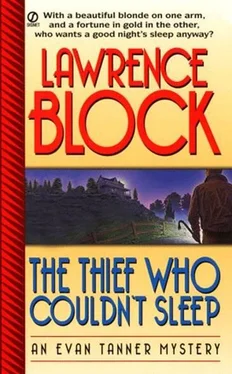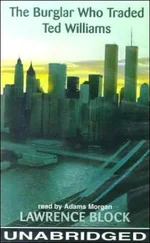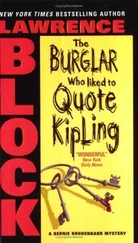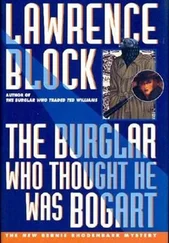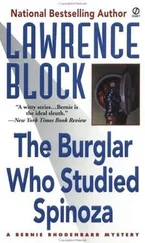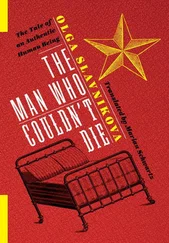I hit a stone and fell off the bicycle. By now, I thought, dragging myself to my feet and hauling the cycle to an upright position, by now I would be snug in the belly of a Pan American jet bound for Washington. In a few hours I would be explaining the foolishness of the situation to a pleasant young agent with a crew cut and a firm handshake. We would laugh together about the vagaries of the Turkish Government and the absurdity of our suspicion-ridden world. He would buy me a drink, I would buy him a drink, we would sit in a bar somewhere warm and dry, and in the morning, after a full evening of drunken camaraderie, I would take a train back to New York and my apartment and my books and my projects and my societies and my Kitty.
I mounted the bike and pressed onward.
I reached and passed the town of Patrickswell-a scattering of small shops, a church, a few dozen cottages. I seemed to have been riding forever. It was darker now, and the rain was coming down harder than before. I reached the fork in the road that pointed me toward Croom. I had been sure I would miss it, but I swung to the left and headed into a long downhill stretch that gave me a chance to stop pedaling, relax, and coast a while. I wished that I had stopped in Patrickswell for a drink and a bite to eat. I wished I had stayed in a pub in Limerick until it stopped raining, if it ever did stop raining in Ireland. I wished that the Irish Republican Brotherhood would do something about the damned rain. I wished I was on the plane for Washington.
Croom was small and silent, a nest of cottages, a two-story hotel, a block of storefronts in the center of town. I parked my cycle in front of a pub and went inside. It seemed to be a grocery store as well as a pub. There were two men at the bar drinking whiskey and another man behind the bar sipping beer. I had a drink of John Jameson. The three were talking in Gaelic.
In English I asked the bartender if he knew where P. P. Dolan lived.
He gave me tortuous directions. It seemed impossible that so small a town could hold a house so difficult to reach. I thanked him and went outside. The drink was making my head swim, and when I mounted the cycle again I didn’t think I would be able to ride at all. The few minutes in the pub had been just enough time for my legs to knot up completely.
I followed the directions, made all the correct turns, and found the house. It was a small cottage, gray in the dim light. A television antenna perched on the thatched roof, and smoke trickled upward from the chimney.
I staggered to the door, hesitated, tried to catch my breath, failed, and rapped on the door. I heard footsteps, and the door was drawn open. I looked at the little man in the doorway and remembered the Victor McLaglen I had visualized. This man was more a leprechaun, short, gnarled, with piercingly blue eyes.
“P. P. Dolan?”
“I am.”
“Padraic Pearse Dolan?”
He seemed to straighten up. “Himself.”
“You’ve got to help me,” I said. The words flowed in a torrent. “I’m from America, from New York, I’m a member of the Brotherhood-the Irish Republican Brotherhood-and they’re after me. I was in jail. I escaped when we reached Ireland. You have to hide me.” And, gasping for breath, I dug out my passport and handed it to him.
He took it, opened it, looked at it, at me, at it again. “I don’t understand,” he said gently. “The picture’s no likeness of you at all. And it says that your name is…let me see”-he squinted in the half light-“Mustafa Ibn Ali. Did I say that properly?”
If you’ll come inside and sit by the fire, Mr. Ali,” the little man was saying. “It’s cold outside, and so damp. And would you take a cup of tea, Mr. Ali? Nora, if you would be fixing Mr. Ali a cup of tea. Now, Mr. Ali-”
I had made two mistakes, it seemed. When I changed my summer suit for proper Irish clothing, I had transferred only one passport and the wrong one at that. My own passport remained in my suit. And my suit, so carefully wrapped by the young clerk, had somehow been separated from me. I had carried the parcel into the pub, but I hadn’t had it with me when I left Mulready’s cycle shop. I’d left it either at the pub or with Mulready, suit and passport and all.
“My name’s not Mr. Ali,” I said. “I took his passport by mistake. He’s a Turk. He was my jailer in Turkey. He was taking me back to America when I escaped.”
“You were a prisoner, then?”
“Yes.” His face seemed troubled by this, so I added, “It was political, my imprisonment.”
This eased his mind considerably. Nora, his daughter, came over to us with the tea. She was a slender thing, small-boned, almost dainty, with milk-white skin and glossy black hair and clear blue eyes. “Your tea, Mr. Ali,” she said.
“It’s not his name after all,” her father said. “And what would your name be, sir?”
“Evan Tanner.”
“Tanner,” he said. “Forgive me if I seem to pry, Mr. Tanner, but what led you to come here? To Croom and to my house?”
I told him a bit of it. He became quite excited at the thought that I was an American member of the Brotherhood and that I had heard of him. “Do they know of me, then, in America?” he mused. “And who would have guessed it?”
But it was Nora who seized on my name. “Evan Tanner. Evan Michael Tanner, is it?”
“Yes, that’s right-”
“You know him, Nora?”
“If it’s the same,” she said. “And Mr. Tanner, is it you who writes articles in United Irishmen? Oh, you know him, Da. In last month’s paper, the article suggesting that honorary representatives of the Six Counties be given seats in the Dail. ‘Wanted: Representation for Our Northern Brethren,’ by Evan Michael Tanner, and wasn’t it the article you admired so much, and saying what a grand idea it was, and wouldn’t you like to shake the hand of the man that wrote it?”
He looked wide-eyed at me. “And was it you who wrote that article, Mr. Tanner?”
“It was.”
He took the tea from me. “Nora,” he said, “spill this out. Bring the jar of Power’s. And hurry over to Garrity’s and fetch your brother Tom. I only wish my eldest son could be here, Mr. Tanner, for it’s glad he’d be to meet you, a faithful member of the Brotherhood that he is, but the poor lad’s in England now.”
“Not in jail, I hope.”
“No, praise God, but working in an office there. For what can a young man do to earn his keep in this godforsaken country? Go quickly, Nora, and bring Tom back with you. And mind who you tell!” He shook his head sadly. “It’s a hell of a thing to say,” he explained, “but there are spies and informers everywhere.”
The four of us, Dolan and Nora and Tom and I, listened to the latest developments in the Evan Tanner case on the kitchen radio. It seemed that Mustafa had seen a good number of James Bond movies, and they had served to supplement his account of my escape. According to the radio report, I was a dangerous spy of unknown allegiance being returned to America after attempting to infect all of Turkey with a plague of cholera. In the Shannon lavatory I had crushed a small pellet between my fingers, liberating a gas that temporarily paralyzed Mustafa’s spinal column. Though he fought valiantly, he was in no condition to prevent my knocking him unconscious and trussing him up.
It was assumed that I had taken refuge in Limerick. The gardai were presently combing Limerick City, their numbers reinforced by a special detachment of plain-clothes detectives sent up from Dublin, and an arrest would no doubt be made in a matter of hours.
“It looks bad,” I said. “Sooner or later they’ll turn up the suit and spot the passport. Once they trace me to the bicycle shop, Mr. Mulready will be able to tell them that I went to Croom. And if they follow me this far, they’ll be sure to find me.”
Читать дальше
